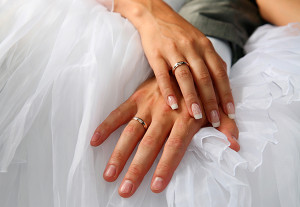Did You Marry the Right Person?
The answer to that question is: not likely. Duke University ethics professor Stanley Hauerwas has written, “We always marry the wrong person.”
Hauerwas was speaking in deliberately generalist terms, but the point he was trying to make is that there is no perfectly right person to find as a marriage partner – mostly because there are no perfect people, and also because people constantly change.
That makes marriage a relationship that requires effort.
 Granted, it seems to be worth it. Despite statistics that show almost half of all marriages end in divorce – the greatest percentage of divorces occur between couples who marry before age 18. More encouraging are the studies which reveal that married people have greater physical and mental health, and the statistics that show people who stay continuously married have 75 percent more wealth at retirement.
Granted, it seems to be worth it. Despite statistics that show almost half of all marriages end in divorce – the greatest percentage of divorces occur between couples who marry before age 18. More encouraging are the studies which reveal that married people have greater physical and mental health, and the statistics that show people who stay continuously married have 75 percent more wealth at retirement.
Despite the good news about marriage, people struggle with today’s cultural interpretation that love should come naturally – you shouldn’t have to work so hard at it if it’s the right thing.
Yet, for love of the sport, good athletes put in hours of practice every day. For love of their art, artists pour their hearts into work every day. For the love of their children, good parents address the needs of their children almost without ceasing – whether they feel like it or not.
A common thread here is love is fundamentally more action than emotion. Emotion is clearly a factor – but those who really love know it transcends mere affection. Danish philosopher Søren Kierkegaard observed that when you feel great delight in someone, meeting their needs and getting their gratitude is extremely rewarding to your ego – and that you may not, in those instances, be loving that person so much as loving yourself. He proposes the question, ‘Do you love the person and his/her best interest, or love the affection and esteem you are getting from that person?’
It is a mistake to think you must feel love to give it. A definition of love which stresses affectionate feelings more than unselfish actions will cripple the ability to maintain and grow strong love relationships.
The good news is: actions of love lead to feelings of love. Emotions eventually catch up to behaviors. That is why married love must not be identified simply with emotion or merely with dutiful action – but a complex mixture of both.
In any relationship there are periods in which your feelings of love seem to dry up. That’s when it’s important to remember the essence of love is more than feeling. You many not feel understanding, forgiving and helpful – but in you actions you must be understanding, forgiving and helpful. As time goes on you will not only get through the dry spells, they will become less frequent and deep and you will be come more constant in your feelings.
Emotions can’t be commanded, only actions. Talking this through with a trusted counselor or advisor can make a huge difference in how you see marriage – and how you can literally improve the relationship.
You can explore the possibility of help from Counselors on Demand by signing up for a free 30-minute session. Any one of the accredited therapists can meet you where you are, using online tools to blend a face-to-face connection with convenience and privacy.
Learn more about how online therapy can help by contacting Counseling on Demand today.